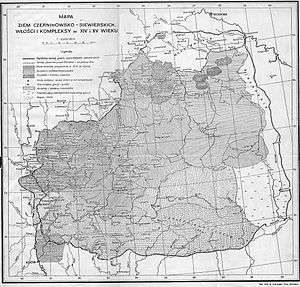Principality of Chernigov
| Principality of Chernigov Чєрниговскоє кънѧжьство (Old East Slavic) | |||||||||
|---|---|---|---|---|---|---|---|---|---|
| 988–1402 | |||||||||
 Coat of arms
| |||||||||
.jpg) Principalities of Kievan Rus' (1054–1132) | |||||||||
| Status | Principality | ||||||||
| Capital | Chernihiv | ||||||||
| Common languages |
Official language: Old East Slavic | ||||||||
| Religion |
Official religion: Orthodox | ||||||||
| Government | Monarchy | ||||||||
| Prince | |||||||||
| Legislature | Prince | ||||||||
| History | |||||||||
• Established | 988 | ||||||||
• Disestablished | 1402 | ||||||||
| Currency | Grivna | ||||||||
| |||||||||
| Today part of | Russia, Ukraine, Belarus | ||||||||
The Principality of Chernigov (Old East Slavic: Чєрниговскоє кънѧжьство, Ukrainian: Чернігівське князівство) was one of the largest states within Kievan Rus'. For a time the principality was the second most important after Kiev.
Location
Most of the Principality of Chernigov was located on the left bank of the river Dnieper, within the basins of the Desna and Seim rivers. The principality was supposedly populated by mostly Slavic tribes of Siverians and partially by the Dnieper Polans. Later the territory of the principality extended to the lands of Radimichs and partially the Vyatichs and Drehovichs. The capital of the principality was the city of Chernihiv (Chernigov). Other important cities were Novhorod-Siversky, Starodub, Bryansk, Putyvl, Kursk, Lubech, Hlukhiv, Chechersk, Homel (Gomel), Bilhorod (Belgorod), Vyr, and others. Ownership and influence of the Chernigov Principality reached far to the North (to the Murom-Ryazan Land) and to the South-East (Tmutorokan Principality).
History
According to the Primary Chronicle, before the 11th century the principality was ruled by local tribal elders and voivodes from Kiev who were appointed by the Grand Prince to collect tribute from the local population, manage judicial trials, and defend the land from external enemies. In the years 1024–1036 the principality of Chernigov was passed under the administration of son of the Vladimir the Great, Mstislav of Chernigov, who came there from Tmutorokan. Together with Yaroslav the Wise, Mstislav ruled the Kievan Rus' establishing Chernigov as one of the most important administration centers in Rus'. Upon the death of Mstislav, Chernigov was incorporated into the realm of Kiev.
After Yaroslav the Wise the principality of Chernigov was passed to one of his sons, Grand Prince Sviatoslav, who initiated the Chernigov branch of the Rurikids. During the civil war of the Yaroslavichi, Chernigov was contested between sons of Svyatoslav and Vsevolod. By the decision of the Liubech Congress in 1097, the sons of Sviatoslav, Oleg, Davyd, and their descendants, secured the principality. After that the principality obtained a certain degree of autonomy and was primarily secured after the Oleg's descendants.
The Principality was later split into three main apanage principalities: Chernigov, Novgorod-Seversk, and Murom-Ryazan, while Tmutarakan, due to its remoteness, often became contested and eventually was overtaken. Murom and later the Ryazan principality drifted away from the influence of Chernigov and after some time was contested by the Principality of Vladimir. Nonetheless the influence of Chernigov princes remained large and they retained the title of Kiev Grand Prince for some time. Chernigov was one of the largest economic and cultural centers of Kievan Rus'.
List of counties

The counties of Chernigov, according to the book "Lands of Chernihiv-Siveria", published in Warsaw in 1936 by Polish historian from Russia Stefan Maria Kuchinsky:
- Oster
- Chernihiv
- Liubech
- Rechytsia
- Putyvl
- Bilhorod
- Rylsk
- Novhorod-Siversky
- Starodub
- Homel
- Propoisk
- Chechersk
- Mglin
- Briansk
- Trubetsk
- Karachev
- Novosil
- Yelets
- Mezetsk
See also
- Prince of Chernigov for list of rulers
- Upper Oka Principalities, counties along the Oka River
- Severia